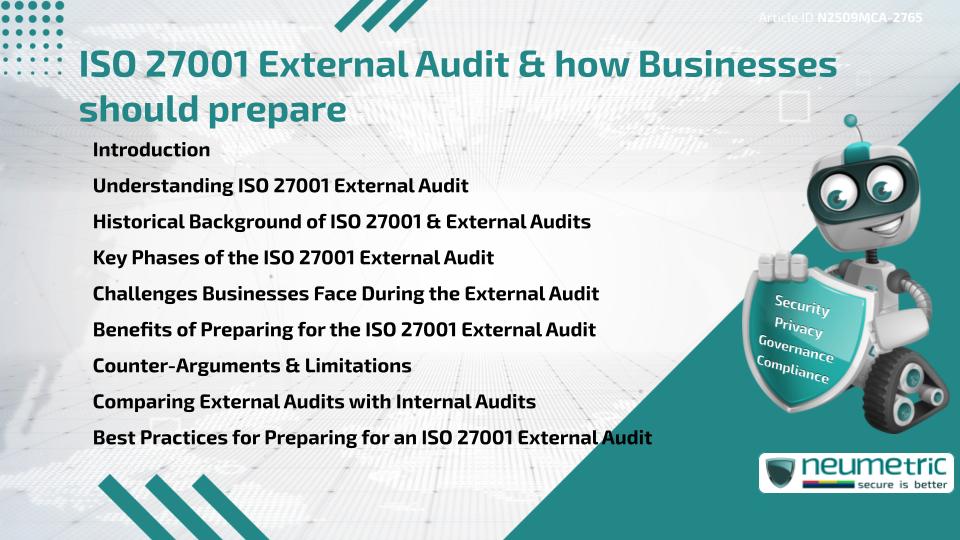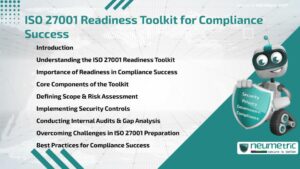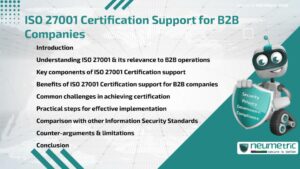Table of Contents
ToggleIntroduction
The ISO 27001 External Audit is a formal Assessment conducted by accredited Certification Bodies to verify whether an organisation’s Information Security management system [ISMS] complies with ISO 27001 requirements. Businesses preparing for this Audit must demonstrate that their Security Controls, Policies & processes are effectively implemented. By approaching the ISO 27001 External Audit with thorough preparation, companies can strengthen their compliance posture, reduce Risks & build trust with clients & regulators.
Understanding ISO 27001 External Audit
The ISO 27001 External Audit evaluates how well an organisation meets the requirements of ISO 27001, the global Standard for Information Security. Unlike internal Audits, which are self-conducted, an External Audit is performed by an independent & accredited body. Its purpose is to validate that the ISMS is not only documented but also actively applied & continuously improved.
Historical Background of ISO 27001 & External Audits
ISO 27001 was first published in 2005 & later revised in 2013 & 2022, evolving as the leading Standard for Information Security. External Audits have always been central to the Certification Process, providing impartial assurance that Organisations meet the standard’s stringent requirements. Over time, as Cyber Threats grew more complex, the role of External Audits expanded to include greater scrutiny of Risk Management & continual improvement practices.
Key Phases of the ISO 27001 External Audit
An ISO 27001 External Audit typically takes place in two main stages:
- Stage 1 Audit: A preliminary review of the ISMS documentation, Policies & scope. Auditors verify that the foundation for compliance is in place.
- Stage 2 Audit: A detailed examination of implemented controls, Risk Management processes & operational practices. Auditors assess whether the ISMS functions effectively in practice.
- Surveillance Audits: Conducted annually after Certification to ensure continued compliance & improvement.
- Recertification Audit: Performed every three years to renew ISO 27001 Certification.
Challenges Businesses Face During the External Audit
Businesses may encounter several challenges during the ISO 27001 External Audit, including:
- Gaps in documentation or outdated Policies.
- Inconsistent implementation of Security Controls across departments.
- Lack of Employee awareness or training on ISMS requirements.
- Difficulty demonstrating continual improvement processes.
- Stress associated with Auditor scrutiny & tight timelines.
Benefits of Preparing for the ISO 27001 External Audit
Thorough preparation for the ISO 27001 External Audit provides multiple benefits:
- Reduces the Risk of Non-Conformities that delay certification.
- Enhances credibility with clients, partners & regulators.
- Demonstrates a proactive commitment to managing Information Security Risks.
- Improves internal processes through structured documentation & Control Implementation.
- Strengthens Employee awareness of security responsibilities.
Counter-Arguments & Limitations
Some argue that External Audits are costly & resource-intensive, especially for smaller businesses. Others claim they can become a compliance exercise rather than a genuine improvement initiative. While these criticisms hold some weight, the External Audit remains a valuable tool for ensuring accountability, credibility & global recognition of an organisation’s ISMS.
Comparing External Audits with Internal Audits
Internal Audits are conducted by an organisation’s own staff or internal teams, while External Audits are performed by independent Certification Bodies. Internal Audits help identify weaknesses before external reviews, but only the ISO 27001 External Audit can grant certification. Together, they provide complementary assurance, with internal Audits preparing the ground & External Audits validating compliance.
Best Practices for Preparing for an ISO 27001 External Audit
To prepare effectively for the ISO 27001 External Audit, businesses should:
- Conduct thorough internal Audits to identify & resolve gaps.
- Keep ISMS documentation updated & accessible.
- Train Employees on their roles in maintaining compliance.
- Perform mock Audits to simulate the external review process.
- Ensure continual improvement is embedded in processes.
- Engage leadership to support & champion compliance efforts.
Conclusion
The ISO 27001 External Audit is a rigorous but essential step for businesses seeking certification. With proper preparation, companies can not only achieve compliance but also strengthen their overall Information Security posture.
Takeaways
- The ISO 27001 External Audit validates compliance with the ISO 27001 standard.
- It includes stages such as documentation review, control Assessment & surveillance Audits.
- Businesses face challenges like documentation gaps & lack of training.
- Preparation delivers benefits such as credibility, Risk reduction & process improvement.
FAQ
What is the ISO 27001 External Audit?
It is an independent Assessment conducted by Certification Bodies to verify compliance with ISO 27001.
What are the stages of the External Audit?
They include Stage 1 (documentation review), Stage 2 (implementation review), surveillance Audits & recertification Audits.
How should businesses prepare for the Audit?
They should update documentation, conduct internal Audits, train staff & perform mock Audits.
What challenges do Organisations face during the Audit?
Challenges include inconsistent Control Implementation, lack of Employee awareness & outdated documentation.
Difference between External Audit & Internal Audit?
Internal Audits are self-conducted, while External Audits are performed by accredited Third Parties & grant certification.
Is the External Audit necessary for certification?
Yes, only an External Audit can confirm compliance & award ISO 27001 Certification.
References
- ISO – Information Security Standards
- NIST – Cybersecurity Framework
- Council of Europe – Data Protection and Privacy
Need help for Security, Privacy, Governance & VAPT?
Neumetric provides organisations the necessary help to achieve their Cybersecurity, Compliance, Governance, Privacy, Certifications & Pentesting needs.
Organisations & Businesses, specifically those which provide SaaS & AI Solutions in the Fintech, BFSI & other regulated sectors, usually need a Cybersecurity Partner for meeting & maintaining the ongoing Security & Privacy needs & requirements of their Enterprise Clients & Privacy conscious Customers.
SOC 2, ISO 27001, ISO 42001, NIST, HIPAA, HECVAT, EU GDPR are some of the Frameworks that are served by Fusion – a SaaS, multimodular, multitenant, centralised, automated, Cybersecurity & Compliance Management system.
Neumetric also provides Expert Services for technical security which covers VAPT for Web Applications, APIs, iOS & Android Mobile Apps, Security Testing for AWS & other Cloud Environments & Cloud Infrastructure & other similar scopes.
Reach out to us by Email or filling out the Contact Form…





